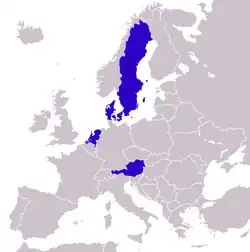The Frugal Four | |
|---|---|
 Members of the Frugal Four after Germany's departure (shown in blue). | |
| Membership | |
| Area | |
• Total | 618,800 km2 (238,900 sq mi) |
| Population | |
• 2019 estimate | 42,313,923 |
• Density | 68.5/km2 (177.4/sq mi) |
| GDP (PPP) | 2019 estimate |
• Total | $2.480 trillion[1] |
• Per capita | $58,406 |
| Currency | Euro (€) Swedish Krona Danish Krone (EUR SEK DKK) |
The Frugal Four is the nickname of an informal cooperation among like-minded fiscally conservative European countries, including Austria, Denmark, the Netherlands and Sweden. It partly evolved as a successor of the New Hanseatic League that was set up to make up for the loss of the like-minded United Kingdom in the European political arena after Brexit.[2] However, it was never founded as a transnational organisation like similar cooperations of countries in the European Union with shared interests.
Along with like-minded Germany, the Frugal Four advocate for EU budget rebates and tight fiscal policies in the eurozone governed by the Stability and Growth Pact, and generally advocate against a large distributive European budget and collective EU debt.[3] They are, however, not Eurosceptic.[4]
The Frugal Four experienced widespread media coverage throughout the COVID-19 pandemic in Europe.
Position
In an op-ed by Austria's former chancellor Sebastian Kurz published in the Financial Times, he described the goals of the Frugal Four as a focus on budget contribution to the EU remaining stable, namely at a maximum of 1 per cent of the EU's gross national income, as well as devoting at least 25 per cent of it to fighting climate change. Furthermore, the Frugal Four wish for spending conditions that are tied to supporting the effective implementation of EU-wide policy objectives and the upholding of the rule of law.[4] These positions came as a response to those countries within the bloc that see a need for higher contributions to the EU's budget after Brexit. The Frugal Four also disagrees with the idea of Eurobonds, a tool for joint bonds within the eurozone, as well as taking mutualised debts within the EU.[5] As a consequence, the group stands opposed to the idea of corona bonds as well.
Frugal Four heads of government in 2023
COVID-19 pandemic and member change
During a summit of EU leaders on March 26, 2020,[6] Germany and the Frugal Four rejected a joint European recovery initiative.[7] Germany was widely considered to be as fiscally conservative as the Frugal Four, hence the context in which the coalition of states was also sometimes referred to as the "Frugal Five".[8] This changed in May 2020 the latest when Germany joined France's call for a €500 billion recovery fund for the EU.[9] This new measure to tackle the pandemic and its consequences would lead to shared borrowing with other EU member countries, a position that Germany tried to avoid until that point.[10] Later the original group's demands were supported by Finland.[11]
Although the Frugal Four in a non-paper vetoed any deal “leading to debt mutualisation”,[12] they eventually accepted the joint European Next Generation EU fund on the European Council in July 2020.[13]
References
- ↑ "GDP, PPP (current international $) - Austria, Denmark, Netherlands, Sweden". The World Bank.
- ↑ "The EU's new Hanseatic League picks its next Brussels battle". Financial Times. October 2018. Retrieved 23 May 2020.
- ↑ "After Brexit, who will be the British of the EU?". Economist. 30 January 2020. Retrieved 23 May 2020.
- 1 2 Kurz, Sebastian (16 February 2020). "The 'frugal four' advocate a responsible EU budget". Financial Times. Retrieved 23 May 2020.
- ↑ "'Frugal four' nations counter Franco-German EU initiative". DW. Retrieved 23 May 2020.
- ↑ Video conference of the members of the European Council, 26 March 2020 Retrieved 15 January 2021.
- ↑ EU leaders clash over economic response to coronavirus crisis Retrieved 15 January 2021.
- ↑ "EU Budget negotiations: the 'frugal five' and development policy". ETTG. 21 January 2020. Retrieved 23 May 2020.
- ↑ "Coronavirus: France, Germany propose €500 billion recovery fund". DW. 18 May 2020. Retrieved 23 May 2020.
- ↑ McHugh, David (19 May 2020). "Germany breaks taboo in effort to get EU through pandemic". CTV News. Retrieved 23 May 2020.
- ↑ "Coronavirus: EU leaders reach recovery deal after marathon summit". BBC News. 21 July 2020. Retrieved 21 July 2020.
- ↑ Non-paper EU support for efficient and sustainable COVID-19 recovery Retrieved 15 January 2021.
- ↑ Special European Council, 17-21 July 2020 - Main results Retrieved 15 January 2021.
_(cropped)_(cropped).jpg.webp)
_(cropped).jpg.webp)
.jpg.webp)
.jpg.webp)